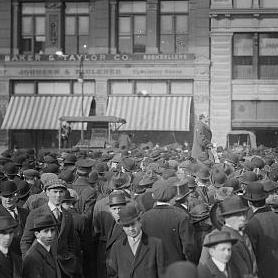In the 1890s, Group Maspeth, an Anarchist organization, numbered 30 members and was the largest group of German anarchists in Queens. Their meeting places were generally located in saloons or hotels on or near Grand Avenue. Believing capitalism to be evil, members of Group Maspeth infiltrated the workforce at area factories in order to cause havoc and destruction. In 1893, the New York Times chronicled the story of planted bombs at E.V. Crandall's Whiting Works on Newtown Creek. Here we present the second segment of the three-part saga.
MASPETH ANARCHISTS ARRESTED
Three Men Said to be in the Crandall Plot Lodged in Jail.
Maspeth, L.I., May 1 – Constable George Hock of Maspeth, L.I., is the hero of the hour with the timid residents of this village and is regarded with sullen rage by the large Anarchist colony because of the war he is waging against bombmakers.
Yesterday he arrested Henry Ruppercht, for whom he had been searching for weeks. Ruppercht was foreman for E.V. Crandall, under whose whiting factory in Maspeth were found a lot of dynamite bombs a month ago, and Ruppercht, with a number of Crandall’s other Anarchist employees, fled. Otto Eckholdt was the only one captured at the time. He said that Ruppercht was the leader of the Anarchist colony and the maker of the bombs.
Constable Hock landed Ruppercht in jail and within a few hours, had Ernest Thordsmith, Mr. Crandall’s missing engineer, under arrest. Then, to complete the good day’s work, he arrested Jacob Miller.
“This,” he said to a New York Times reporter, “completes the crowd that I was after. Now we’ll soon find out who placed the dynamite to blow up Mr. Crandall’s factory and, perhaps, who is responsible for all the mysterious fires in the village for months back.”
Thordsmith and Ruppercht were admitted to $2,000 bail each by Justice Schumacher.
On Thursday, Constable Hock will resurrect the dynamite which he has buried on the outskirts of the village and submit it to experts in the presence of the Assistant District Attorney, at the latter’s request.
Leo Beck, who took the place of Anarchist Ruppercht as foreman of the whiting factory when the latter disappeared, didn’t suit the employees, and yesterday morning they refused to go to work and hints of firing the works are said to have been made.
In this emergency Constable Hock was appealed to, and enacted the role of peacemaker. In two hours, the strikers went back to work under Foreman Beck.
Originally reported in the New York Times, May 2, 1893
BOMBS TO BLOW UP POLICEMEN
Satchel Full At A Meeting of Anarchists in This City.
Startling testimony in the Maspeth Dynamite Case – An Ex-Anarchist Tells What He Knows at a Hearing Before a Justice at Middle Village – Preparations in Cold Blood for the Destruction of Many Lives – Murderous Missiles Ready for Use Against Capitalists and “Cops.”
MASPETH, L.I., May 16. – A remarkable statement was made by a prisoner in a little courtroom in Middle Village, L.I., this evening that will be the reverse of quieting to the nerves of Superintendent Byrnes and his New York policemen.
It was that on at least one occasion, a little less than a year ago, preparations were complete at an assemblage of Anarchists to take the lives of any New York policemen who might undertake to break up the meeting, and that there was a colony of Anarchists close to New York who were seemingly ready and anxious for the opportunity to use dynamite against peace officers of that city.
The occasion of the confession was the trial of Henry Ruppercht of Maspeth, charged with an attempt to blow up the factory of the Standard Whiting Works, of which E.V. Crandall is proprietor and where Rupprecht was foreman.
Constable George Hock of Maspeth testified that he had found three dynamite bombs in the stable of the Whiting factory in March last, and within the next day or two, a big tin can of the explosive under the costly engine and machinery. Its hiding place was pointed out by Otto Eckholdt, who was brought from the Queens County Jail for the purpose. The story of this discovery had already been published in the New York Times.
The constable told how he took charge of the explosive and spent several anxious days and nights in the company before the thought occurred to him to bury it in an outlying field. He had resurrected it yesterday, he said, an submitted it to Expert John Holliday of Sumpter Street, Brooklyn, who, after partially blowing himself up with it this morning, had pronounced it dynamite.
Chemist Holliday tested one of the caps found and a bit of the dynamite at Maspeth yesterday. He was promptly knocked down. The rest he took to his Brooklyn home and experimented some more there, with the result of wrecking his windows and frightening his family. On the witness stand in Justice Schumacher’s little court this evening, he said he had no further doubts of its being dynamite, and that the quantity found in the Whiting factory was sufficient to obliterate a whole city block.
Mr. Crandall, proprietor of the Whiting factory, told of the reign of terror when he had his factory full of Anarchist employees. He told of the incendiary fire that destroyed his factory last September. Eckholdt is in jail under indictment charging him with starting this fire. He declares that it has been laid at his door by his fellow Anarchists to make him the scapegoat.
Prisoner Eckholdt’s testimony today was sensational in the extreme. He said that Ruppercht, while foreman of the factory, had the men in fear of him; that he would employ none but Anarchists, and that even Mr. Crandall “had to dance when he whistled.” He swore that Ruppercht made the dynamite and made the bombs. The witness had put the dynamite bombs under the engine room floor at Ruppercht’s direction, because Ruppercht was too large a man to crawl under the floor himself. Ruppercht had assured him they were placed there for safekeeping only, but witnesses believed that they were put there to blow up the factory.
Pressed by counsel for Ruppercht to tell a single other occasion when he had seen Ruppercht have bombs in his possession, he said:
“Well, one night when we all went to New York to an Anarchist meeting in Union Square, about a year ago, Ruppercht took a satchel full of bombs with him for –
“Well, I might as well make a clean sweep. He took them to blow up the police with if they interfered with the meeting. The police didn’t interfere, so they were not used, but there were enough of them to blow up the whole police force.”
Charles Sayres, who is not an Anarchist, was the next witness. He was a driver employed by Mr. Crandall. He told of having gone along to the Union Square meeting. Thirty-five Anarchists went to the meeting from Maspeth. He saw them in a saloon in a basement, somewhere in Union Square, and Ruppercht was there, he said. He asked Ruppercht what he had in the satchel and Ruppercht replied:
“Bombs to fix the police with.”
“When? Tonight?” the witness asked.
“Yes, or at any other meeting,” Ruppercht replied.
The witness, continuing, said that Ruppercht further said that he intended the bomb for capitalists and “cops,” also for the Whiting factory in case the strike then on was defeated. Charles Meyer and Cord Meyer, Jr., were marked men among the capitalists. They live in Maspeth and are millionaires. They were of the once big sugar refining firm of Dick & Meyer.
Mrs. Eckholdt told of the trip to New York, when the police were to be blown up. She could not remember the names of the speakers at the meeting except one named Ullmann. Herr Most didn’t speak, because the police would not allow him to.
She told of two bombs, which her husband carried that night in his overcoat pockets, and which he afterward gave to Ruppercht, who put them in the satchel. One, she said, was as long as her forearm and thicker than her arm. Both ends of the pipe were stopped up and it was loaded with dynamite.
When the testimony taken today is laid before the District Attorney, he will probably hold Ruppercht for the Grand Jury.
Originally printed in the New York Times, May 17, 1893.



